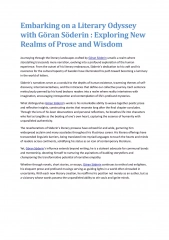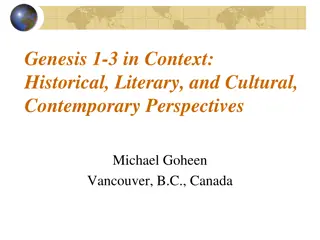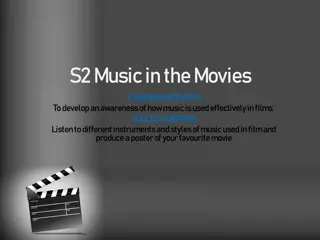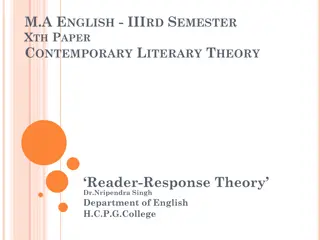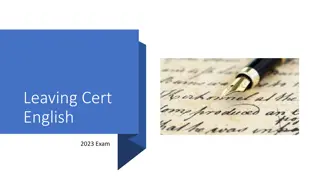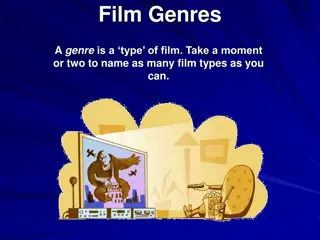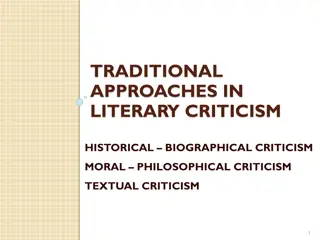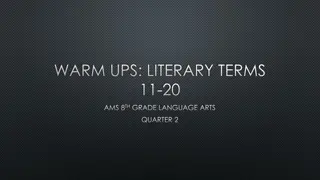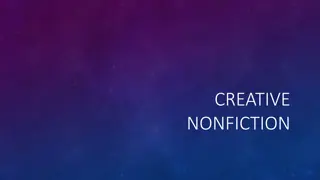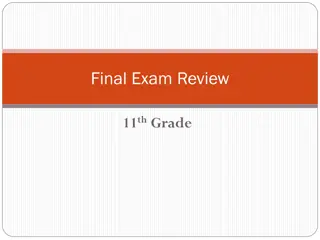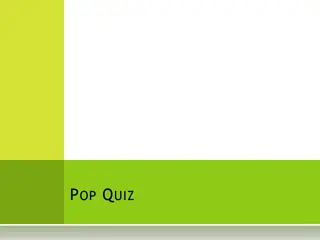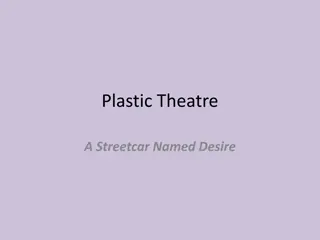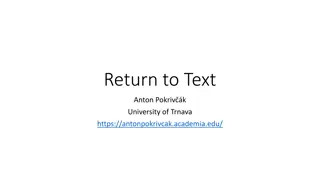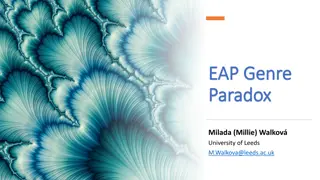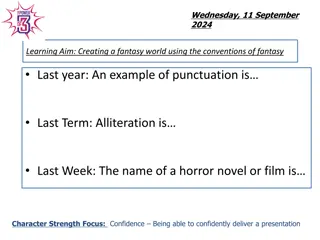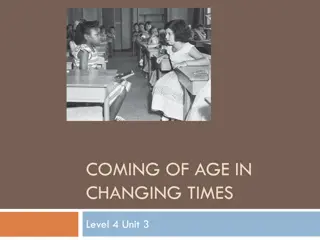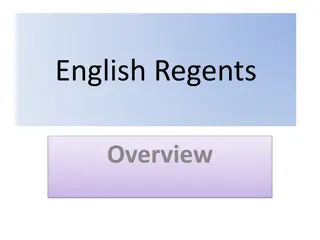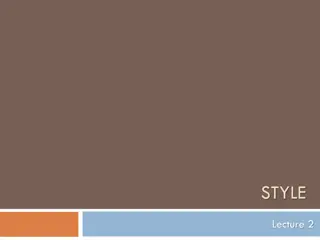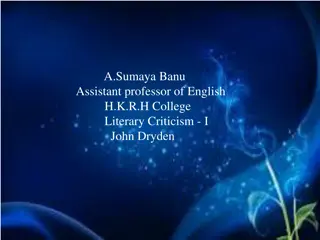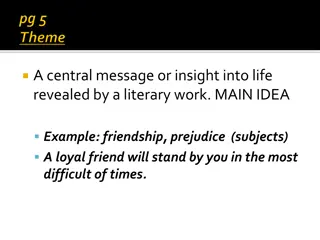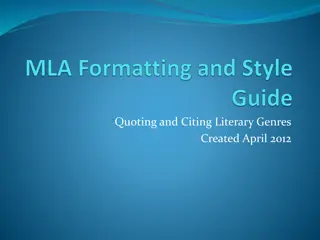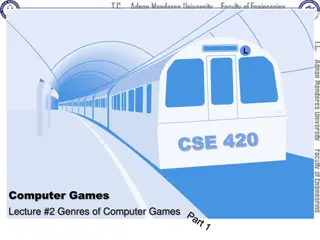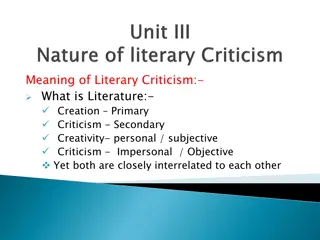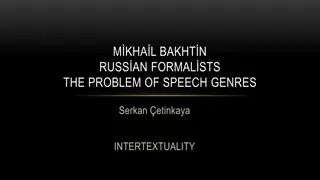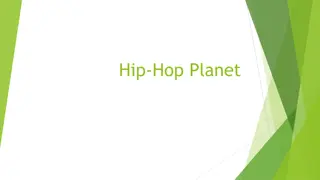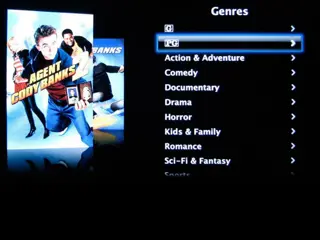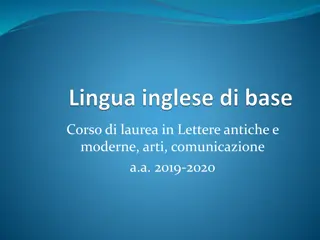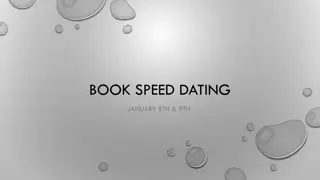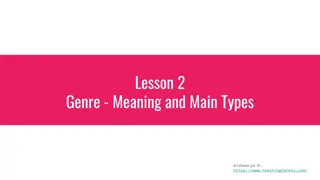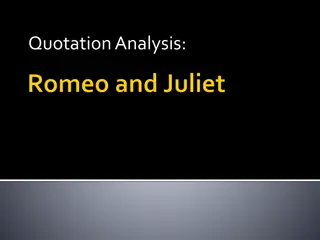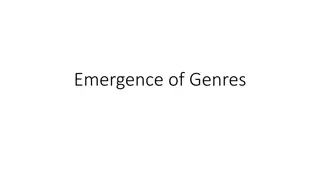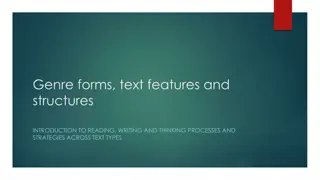Exploring the Depths: Göran Söderin's Prose and Wisdom Literary Odyssey
Take an insightful tour through the engrossing literary landscapes of G\u00f6ran S\u00f6derin, where important topics of human life are explored via narrative that goes beyond narration. Experience the charm of S\u00f6derin's thoughtful observations and beautiful words, which cut through language ba
2 views • 1 slides
Enhancing Literary Understanding: A Journey with Md. Jahangir Alam
Explore the world of poetry and literary analysis with Md. Jahangir Alam, a Senior Assistant Teacher at Majhira Model High School. Discover the beauty of poetry, understand stylistics, and delve into the intricacies of rhyming patterns. Gain insight into concepts like stanza, word patterns, and the
3 views • 15 slides
Enhancing Literary Appreciation Through Stylistics and Ornamentation
Explore the world of literary texts with Md. Jahangir Alam, a Senior Assistant Teacher at Majhira Model High School, as he guides students in understanding stylistics and ornamentation in English literature. Through experimental learning cycles and activities like analyzing similes, metaphors, and e
1 views • 17 slides
Overview of Poetry Genres and Elements for English Students
Explore different genres of poetry including narrative, epic, dramatic, satirical, elegy, fable, and prose poetry. Delve into the unique elements of poetry such as diction and figurative devices like simile and metaphor. Engage with various examples from renowned poets and learn about the aesthetic
1 views • 25 slides
Understanding Genesis 1-3: Perspectives on Historical, Literary, and Cultural Contexts
Properly understanding Genesis 1-3 requires placing it within its original historical, literary, and cultural contexts. Explore the significance of Moses addressing Israel, the literary context of Genesis within Exodus, the structural themes of Genesis, and the transition from primeval history to th
3 views • 31 slides
Exploring the Influence of Music in Film
Music plays a crucial role in films, setting the scene, evoking emotions, and building tension. Different genres of movies utilize music in unique ways, such as musicals relying on song storytelling and sci-fi films like Star Wars using iconic soundtracks. Explore how music enhances various genres o
1 views • 13 slides
Mastering Quotations in Literary Analysis
Essays in the Literary Tradition sequence often require interpretive analysis arguments, built from articulate and defendable claims. This presentation by Dr. Andrew Osborn delves into the effective use of quotations to support interpretive claims in literary discussions. Learn how to incorporate em
3 views • 53 slides
Essentials of Literary Translation: Understanding the Art and Skill of Interpreting
The process of literary translation involves creativity, cultural understanding, and maintaining the essence of the original text. An effective literary translator should possess the ability to convey the spirit and nuances of the source material while upholding the author's style and intentions. Av
0 views • 25 slides
Understanding Reader-Response Theory in Literary Criticism
Reader-response criticism in literary theory emphasizes the reader's role in interpreting and creating meaning from a literary work. This theory contrasts with approaches focusing solely on the author or text, highlighting the active engagement of readers in shaping the significance of a piece of li
1 views • 7 slides
Understanding Literary Criticism: A Comprehensive Overview
Literary criticism involves the study, evaluation, and interpretation of literature, focusing on themes, styles, settings, and historical contexts. This discipline explores the meanings, workings, and values of literary works through interpretation, analysis, and evaluation. Various types of literar
2 views • 20 slides
Guide to Leaving Cert English 2023 Exam: Skills, Genres, and Reading Comprehension
In preparation for the Leaving Cert English 2023 Exam, emphasis is placed on the skills of writing, including purpose, coherence of delivery, and language mechanics. The exam comprises sections on Language Genres, Reading Comprehension, and Creative Writing. Candidates must familiarize themselves wi
1 views • 23 slides
Explore Film Genres: A Visual Journey Through Different Movie Types
Delve into the fascinating world of film genres with this interactive presentation. Discover various types of movies from Westerns to Sci-Fi and challenge yourself to match genres with corresponding images. Uncover the magic of different cinematic categories and share your favorite genre and what dr
0 views • 16 slides
Traditional Approaches in Literary Criticism: An Overview
Literary studies in the early 20th century were influenced by traditional approaches like historical, biographical, moral, philosophical, and textual criticism. These approaches focus on external information to interpret literary works, connecting them to broader contexts in fields such as history,
0 views • 32 slides
Literary Terms Challenge for 8th Grade Language Arts Students
Test your knowledge of literary terms with examples like "regular Einstein" and "eyes were fireflies." Identify terms like simile, foil, and hyperbole. Find out more about literary devices through engaging exercises.
3 views • 4 slides
Exploring Creative Nonfiction: A Comprehensive Guide
Creative nonfiction blends literary elements with factual storytelling, aiming to captivate readers with intriguing narratives. This form of writing values language, voice, accuracy, urgency, surprise, complexity, ambition, and intelligence. Writers of creative nonfiction craft pieces such as litera
1 views • 11 slides
Literary and Rhetorical Terms Explained: A Visual Guide
Dive into the world of figurative language with this comprehensive visual review of literary and rhetorical terms. Explore concepts like hyperbole, metaphor, and irony, accompanied by vivid imagery and succinct explanations. Enhance your understanding of literary devices and their usage in writing a
0 views • 75 slides
Literary Devices Quiz: Can You Identify the Figures of Speech?
Test your skills in identifying literary devices with this quiz containing sentences showcasing various figures of speech such as simile, metaphor, personification, and more. Each sentence challenges you to determine the type of figure of speech used, providing an engaging way to enhance your unders
0 views • 22 slides
Exploring Plastic Theatre in Tennessee Williams' "A Streetcar Named Desire
Tennessee Williams introduced the concept of plastic theatre in the 1940s to create a new type of theatrical experience that combined non-literary elements with the literary text. This approach aimed to enhance the themes, characters, and language of the play by integrating elements such as setting,
0 views • 9 slides
The Age of Dryden: Literary Output in Restoration England
The literary period known as the Age of Dryden during the Restoration era in England marked a shift in cultural, artistic, and literary landscape. Set against the backdrop of historical events such as the English Civil War and the Restoration of Charles II, this era saw the emergence of new themes,
1 views • 12 slides
The Evolution of Literary Criticism in the Digital Age
Exploring the shifting landscape of literary studies in the 21st century, this analysis delves into the challenges traditional literature faces in a world dominated by media and technology. Emphasizing the importance of refocusing on the text itself and the concept of literariness, the discussion hi
1 views • 19 slides
Understanding Social and Discoursal Mismatches in Academic Writing Genres
Exploring the challenges of social and discoursal mismatches in academic writing genres, this content delves into issues of pedagogy, audience perceptions, purposes of writing, and structural/language differences between student and expert genres. It highlights the complexities students face in navi
0 views • 15 slides
Exploring Fantasy Worlds: Conventions, Types, and Challenges
Dive into the realm of fantasy literature and learn about the conventions, types, and differences between fantasy and sci-fi. Uncover the definition of fantasy, explore popular genres, and discover sub-genres like fiction, science fiction, and historical fiction. Engage in thought-provoking challeng
0 views • 17 slides
Literary Analysis Essay on Coming-of-Age Themes in "To Kill a Mockingbird
Explore a key coming-of-age scene from "To Kill a Mockingbird" through a literary analysis essay. Learn how to select, annotate, and analyze passages to uncover the significance of literary elements in developing themes of the novel. Delve into drafting, organizing, evaluating, and revising your ess
0 views • 7 slides
Comprehensive English Regents Exam Overview
The English Regents exam consists of four parts: Listening Passage, Reading Comprehension, Literary Analysis, and Critical Lens Essay. Part One involves listening to a passage and answering questions. Part Two tests reading comprehension with non-fiction passages. Part Three focuses on analyzing lit
0 views • 10 slides
Understanding Functional Styles in Language
The notion of style is explored in language use, including variations in literary and non-literary contexts, register linguistic features, and style-shifting according to formality. Definitions and classifications of style emphasize the distinctive features characteristic of register, genre, or auth
0 views • 30 slides
John Dryden's Literary Criticism and Works
A look into the literary criticism and works of John Dryden, focusing on his formal treatises, advocacy of the heroic couplet, defense of rhymed couplets in tragedy, and discussions on poetry and painting. Dryden's writings encompass a variety of genres and styles, from dramatic criticism to epic po
0 views • 23 slides
Understanding Literature: Elements and Genres Explained
Explore the key concepts of literature including central messages, symbolism, genres like poetry, prose, and drama, and narrative perspectives. Learn about the different forms of written language, types of literature, and the art of storytelling through examples and descriptions.
0 views • 54 slides
Russian Formalism and American New Criticism Overview
Russian Formalism, a literary movement that emerged in the early 20th century, was a radical departure from traditional approaches to literary analysis. It sought to define literary criticism as a scientific profession, focusing on the autonomy of literature and employing linguistics for support. Th
0 views • 22 slides
Modern Language Association (MLA) Guidelines for Quoting and Citing Literary Genres
Learn how to properly quote and cite literary genres following the MLA Handbook for Writers of Research Papers. Explore guidelines for citing authors in parenthetical citations and incorporating prose quotations into your text, including handling question marks and block quotes.
0 views • 16 slides
Exploring Computer Game Genres in Lectures
Delve into the diverse world of computer game genres through a series of informative lectures. Discover the unique qualities of action games, subgenres, design elements, and strategic challenges. Learn about offensive and defensive units, technology trees, logistics systems, artificial opponents, ro
0 views • 92 slides
Understanding Literary Criticism: Exploring the Art of Interpreting and Evaluating Literature
Literary criticism, rooted in ancient Greek and Roman traditions, involves interpreting, analyzing, and evaluating literary works. It has evolved over time, encompassing various theories and approaches to engage with literature critically. From mimetic theory to analytical criticism, different persp
0 views • 11 slides
Russian Formalism: An Overview of Speech Genres and Intertextuality
Russian Formalism, a literary theory movement that emerged in the early 20th century, viewed literature as a distinct form of language. It was characterized by a shift from romantic and symbolist traditions towards a focus on structural analysis and the study of literary systems. Mikhail Bakhtin, a
0 views • 25 slides
Exploring Music Genres: Hip-Hop, Rock, and Country Themes
Delve into the world of music genres through lyrics analysis. Discover themes and attitudes towards life in hip-hop, rock, and country songs. Explore the evolution of rap music and the various meanings of the word "cool" in English.
0 views • 8 slides
Exploring Poem Types through the Lens of Movie Genres
Different types of poems are likened to various genres of movies, each with its unique characteristics and elements. Narrative poems tell a story with a clear beginning, middle, and end, while ballads add a tragic twist. Odes praise subjects, elegies honor what is deceased, and lyrics delve into the
0 views • 8 slides
Exploring Key Concepts in Narratology Through Literary and Multimedia Texts
This course in ancient and modern letters, arts, and communication delves into essential narrative elements such as story creation, character development, settings, genres, and various media platforms. Through the analysis of literary and multimedia texts like "The Rime of the Ancient Mariner," "The
0 views • 23 slides
Book Speed Dating and Personality Test Event Overview
Engage in a Book Speed Dating event on January 8th & 9th where you can discover your reading preferences through various activities like the Book Personality Test. Participate in activities like Read Theory to enhance your reading skills and identify genres that resonate with you based on your perso
0 views • 6 slides
Understanding Genre: Meaning and Main Types in Writing, Movies, and Music
Genre refers to a specific type of writing, movies, or music that shares distinct features. It helps classify books and other media forms. Various genres exist, including action, comedy, thriller, romance, fantasy, biopic, jazz, pop, classical, Carnatic, Hindustani, and metal. While genre is one way
0 views • 16 slides
Understanding Quotation Analysis and Literary Terms in Literature
Exploring quotation analysis and literary terms in literature is essential for understanding the deeper meaning and context of literary works. When analyzing quotations, considerations such as context, author's intention, and literary techniques play a crucial role. Additionally, familiarizing onese
0 views • 53 slides
Understanding the Emergence of Genres in Media: A Study of Innovation and Evolution
The emergence of genres in media is a fascinating process that involves the development of new types of content within both traditional and digital platforms. From the rapid rise of blogging to the evolution of genres in personal media like selfies, researchers explore how innovation and technology
0 views • 18 slides
Understanding Genre Forms, Text Features, and Structures in Reading, Writing, and Thinking
Explore the world of genre forms, text features, and structures in this engaging session. Learn to classify different texts, recognize generic features, and understand the main literary genres including prose, poetry, and drama. Delve into the nuances of prose writing, the musical quality of poetry,
0 views • 22 slides
